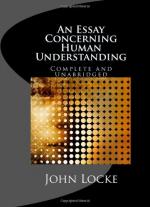
|
| Name: _________________________ | Period: ___________________ |
This test consists of 15 multiple choice questions and 5 short answer questions.
Multiple Choice Questions
1. What effect does desire have on men, according to Locke?
(a) Makes men unhappy.
(b) Makes men powerful.
(c) Makes men ambitious.
(d) Makes men satisfied.
2. How can we understand the properties of things, according to Locke?
(a) By meditating on the things.
(b) By analyzing our ideas of those things.
(c) By performing experiments on the things.
(d) By breaking things into their constituent parts.
3. What is Locke really discussing in his discussion of pleasure and pain?
(a) Variety.
(b) Number.
(c) Complex modes of ideas.
(d) Morality.
4. What can we talk about once we begin to abstract?
(a) Essences of things.
(b) Particular things.
(c) The context for things.
(d) Things in general.
5. What modern movement did Locke prefigure in his arguments about philosophical language?
(a) Ontology.
(b) Deconstruction.
(c) Ordinary language philosophy.
(d) Relativists.
6. What do cause and effect derive from according to Locke?
(a) Cause and effect.
(b) Pain and pleasure.
(c) Freedom and fate.
(d) Good and evil.
7. What are people who believe in human freedom called?
(a) Determinists.
(b) Fatalists.
(c) Relativists.
(d) Libertarians.
8. According to Locke, the lack of what would make social life impossible?
(a) Trade.
(b) Money.
(c) Manufacturing.
(d) Communication.
9. How does Locke define the difference between freedom and will?
(a) Freedom is the ability to act; will is the freedom to choose.
(b) Freedom is the ability to let an internal power dictate one's actions; will is the source of the internal power.
(c) Freedom is the ability to act; will is a type of power.
(d) Freedom is riding light in the harness; will is the engine for progress.
10. Why don't most words refer to simple ideas, in Locke's account?
(a) Locke says that most simple ideas are too unspecific.
(b) Locke says that most words are general.
(c) Locke says that simple ideas are too pervasive.
(d) Locke says that there is too little room for interpretation in simple ideas.
11. What defines a philosophical usage of a word, according to Locke?
(a) Generally accepted definitions.
(b) Essential, eternal meanings.
(c) Highly specialized definitions.
(d) Technical uses in court.
12. What does Locke say words refer to?
(a) Things in the world.
(b) Plants and animals.
(c) Inner ideas.
(d) Experiences of pleasure and pain.
13. What are people who do not believe in free will called?
(a) Ontologists.
(b) Determinists.
(c) Fatalists.
(d) Relativists.
14. How does Locke resolve the contradiction between people who believe in free will and people who do not?
(a) He says that determinism is determined in free choices in every moment.
(b) He says that people have a choice whether to follow their wills.
(c) He says that the world has choices, even if people do not.
(d) He says that there is indeterminism on a sub-atomic level, that allows for free choice.
15. How does Locke define will?
(a) Searching for one's temperament.
(b) Acting in accord with one's preferences.
(c) Following one's impulses.
(d) Letting fate make decisions.
Short Answer Questions
1. What happens to love over time, according to Locke?
2. What is the effect of a passive power?
3. How has God formed man, according to Locke?
4. What does Locke say allows us to see ourselves as free agents?
5. What does Locke say each distinct idea is?
|
This section contains 543 words (approx. 2 pages at 300 words per page) |

|




